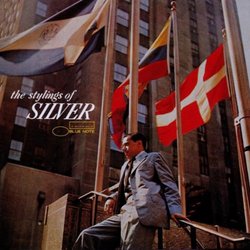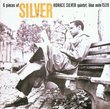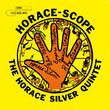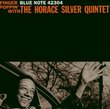| All Artists: Horace Silver Title: Stylings of Silver Members Wishing: 2 Total Copies: 0 Label: Blue Note Records Original Release Date: 1/1/1957 Re-Release Date: 8/27/2002 Album Type: Original recording reissued, Original recording remastered Genres: Jazz, Pop Style: Bebop Number of Discs: 1 SwapaCD Credits: 1 UPC: 724354003424 |
Search - Horace Silver :: Stylings of Silver
 | Horace Silver Stylings of Silver Genres: Jazz, Pop
|
Larger Image |
CD DetailsSimilar CDs
|
CD ReviewsFrom the Golden Years of Hard-Bop G. Schramke | Vienna, Austria | 08/27/2002 (5 out of 5 stars) "For this album, recorded in 1957, Horace Silver used two ideal horn players: Art Farmer and Hank Mobley. Both had tremendous harmonic skills and a perfect sense for rhythm and these two qualities are the quintessence of Horace Silver's music: tricky combinations of latin patterns and swing and the use of very rich and beautiful chord progressions. The first tune, "No Smoking", an up-tempo thing in B-flat minor is an ideal blowing vehicle for the soloists. Some years later, Bud Powell told Horace Silver, how much he liked that tune, he also played it and his version actually was the first time I heard it, so I was eager waiting for this reissue of a long time out of print album. Horace Silver's records always have been perfectly balanced and they are covering different moods, like the minor blues "Soulville", and that most happy feeling on "Home Cooking".A really beautiful thing is the ballad "My One And Only Love", with Silver playing the theme in a most lyrical manner and the horns playing a kind of arrangement behind him." Still in Style Samuel Chell | Kenosha,, WI United States | 05/26/2006 (5 out of 5 stars) "Horace Silver was an effective if limited soloist, an exemplary hard bop accompanist, and, as a composer, a brilliant "miniaturist," contributing compositions that continue to surface and surprise with their inventive, irresistible melodies and inviting harmonic progressions. Unfortunately, the popular and critical success he realized with 1964's "Song for My Father" led to more of the same--formulaic tunes such as the title song, restricted solo space for his musicians, and stiff presentations (the three times I caught him in person reminded me of a pop musician imitating his own recordings). The genius of Horace Silver is to be found in compositions like "Nica's Dream," "Moon Rays," "Strollin'," "Out of the Night Came You," "Ecarole," and this album's "No Smokin'" (a Bud Powell favorite). And his best recordings are the ones that feature Hank Mobley, allowing the gifted melodist as much room as he needs to explore the possibilities of the composer's lyric conceptions. Hank, in turn, always seemed to bring out Horace's romantic side as well as inspire his most sensitive orchestrations and responsive ensembles. (In fact, Mobley's solos proceed so logically, seamlessly from Horace's arrangements of "The Back Beat" and "Home Cookin'" that it's difficult to separate them from the compositions of which they're an integral part.) Add a tasteful, thoughtful musician like Art Farmer to the mix, and the chemistry is pure magic. Ironically, the standard by which I've come to measure Silver recordings is Art Blakey's eponymous 1956 Columbia album, "The Jazz Messengers." "Stylings of Silver" doesn't quite measure up, especially in terms of ensemble cohesiveness and dynamics, but is easily close enough to deserve a Silver medal." The Horace Silver Quintet Chris Covais | 11/03/2005 (5 out of 5 stars) "Horace Silver is one of my favorite hard bop pianists. His sound is clear and fresh, and most of all, is filled with the blues. His sound is completely soulful and I dig it every time I listen to him.
Although he's contributed, writing jazz standards, it's his most obscure titles, meaning the ones that didn't get that much recognition, that are the best in my opinion. This album, Stylings of Silver, starts off with Horace's original, No Smokin. It's fast and furious, and the b section is quite a change from the way they swing it. Louis Hayes plays straight eights on the cymbol, and Art Farmer and Hanky Mobley seem to just fall in place. The Back Beat, got its name, because when you hear it, you're supposed to get the feeling the drummer should be hitting the snare on 2 and 4, when in fact he doesn't. The bass and piano just seem to make you want it there, when Louis Hayes does not supply with it, but instead other forms of creative drumming. Soulville, is obviously very soulful, and is a blues. Horace and the group swing this at a moderate tempo, and Hank Mobley gives a fine tenor solo, I might add. The same can be said for Home Cookin'. The Metamporphosis got its name, according to Silver, because something was developing and changing when he wrote this tune. Horace was always playing with tunes and seeing how many different ways he could do them. That's one of the reasons that made his playing so special. The one and only ballad is, My One and Only Love. It closes out the album. I'd say Horace Silver's best albums were from 1956-1964. He made some classics during that time period, and this is one of them. Horace says in the liner notes that he wanted to explore more latin rhythms, and he did with such hits as Song For My Father, which was filled with latin influenced rhythms. Horace first got his fame playing with Art Blakey, but when he left, he started a whole new era, of making great classic Blue Note sides, and playing better than ever. This is a hard bop classic." |

 Track Listings (6) - Disc #1
Track Listings (6) - Disc #1

